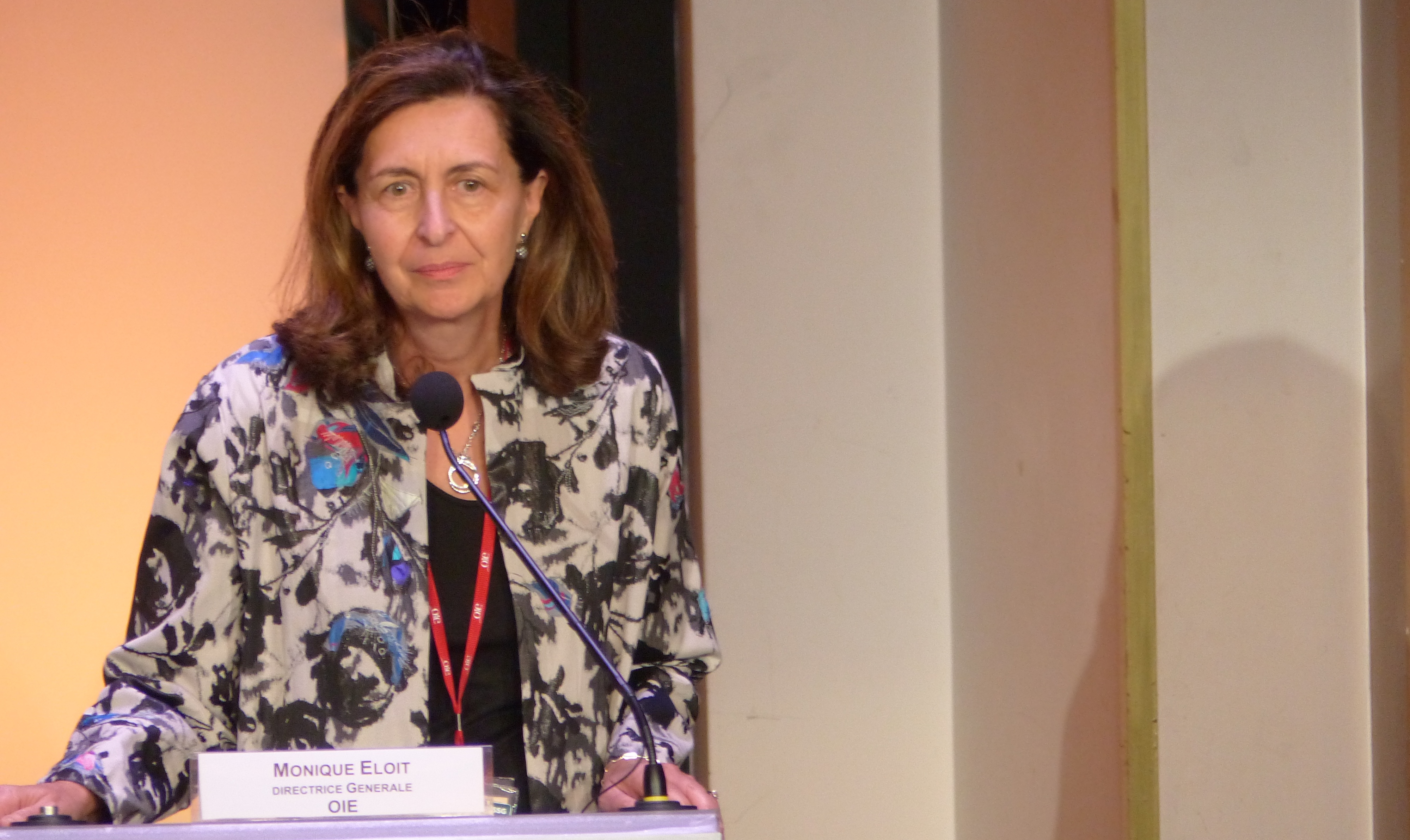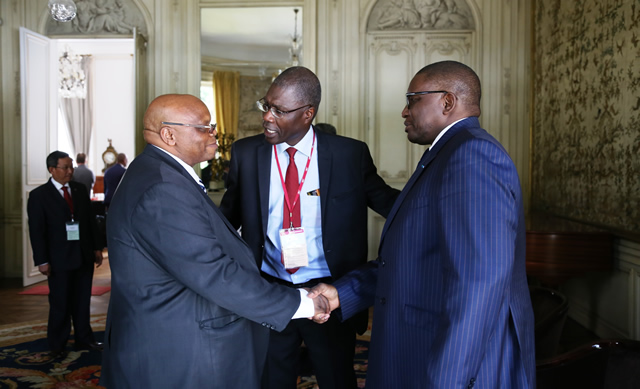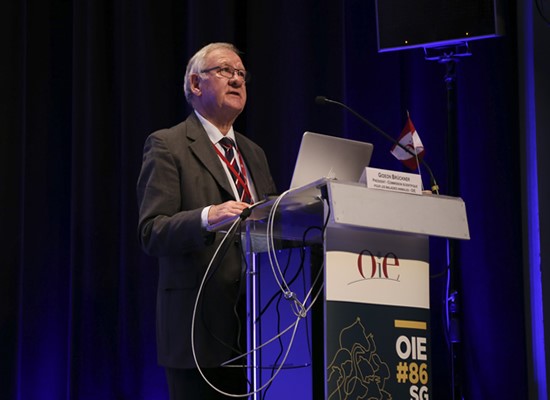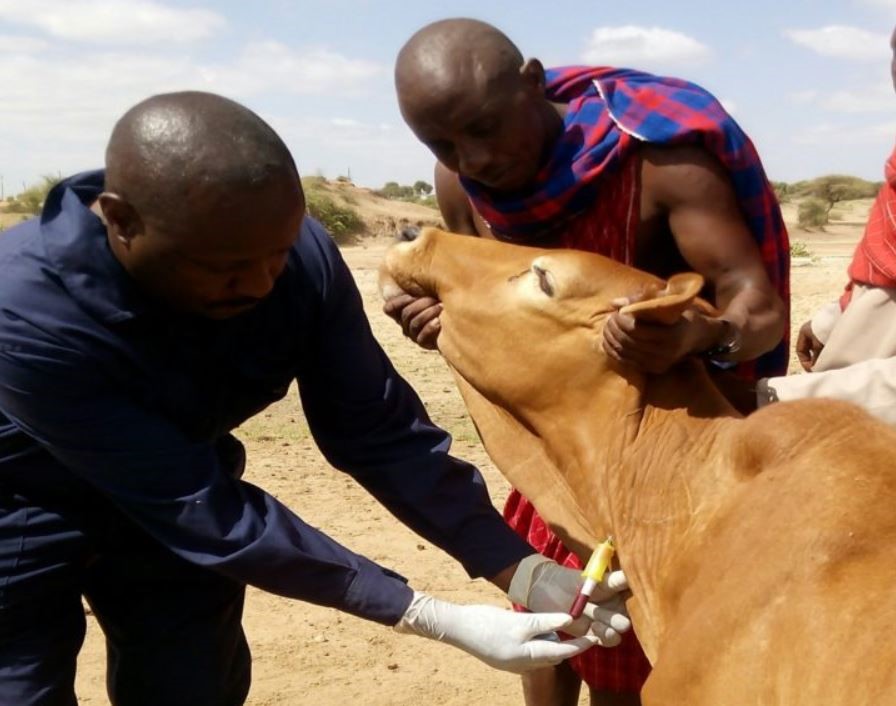
86 GS
The OIE Delegate of Senegal, Dr Mbargou Lô (centre) introduces the OIE President and Delegate of South Africa, Dr Botlhe Michael Modisane (left) to the Senegalese Ambassador to France, H.E. Barissou Sené (right). Picture © Maurine Tric (oie) 2018.
Up to 950 participants, representing national Delegates from 150 out of 181 Member Countries of the OIE and around 60 international, intergovernmental, regional and national organisations participated in the event.
The Opening Ceremony was held in the presence of some 38 Ministers and members of government of OIE Member Countries, as well as the President of the OIE, Dr Botlhe Michael Modisane (South Africa), and the Director General of the OIE, Dr Monique Eloit.
This General Session not only endorsed important new standards and accredited new institutions, it also elected or re-elected the members of the Council, the Regional Commissions and the four Specialist Commissions of the OIE.
H.E. Barissou Séné, Senegalese Ambassador to France, representing the Minister of Livestock and Animal Production of Senegal, delivered an address to the World Assembly highlighting the vital role of livestock for the Sahel region in fighting poverty and ensure food security and, therefore, the crucial need to control animal diseases. He also reminded the audience of the positive impacts of the PRAPS Project (Regional Sahel Pastoralism Support Project), the PVS Pathway missions in his country and the support provided by the OIE Regional and Sub-Regional Representations to the OIE Member Countries in Africa.
Other distinguished guests from Africa also attended the opening ceremony such as:
The President of the OIE, Dr Botlhe Michael Modisane presented OIE Honorary Awards to members of the veterinary community for outstanding services to veterinary science and to the OIE. This year – amongst the awarded members – Dr Michael Graeme Garner (Australia) received the Gold Medal.
The World Assembly approved the composition of the OIE Working Group on Wildlife validated by the OIE Council for the period May 2018 – May 2019. Worth mentioning -for the African continent- is the appointment of Dr Markus Hofmeyr (South Africa / Botswana).
Additional major highlights resulting from this 86th General Session can be consulted here.
Dr Sarah Kahn presented the results of the survey conducted to better understand the level of implementation of the OIE Standards and related challenges in the context of the SPS Agreement. To this end, a questionnaire was sent by the OIE to all 181 Member Countries (72% response rate from African region). When applying more restrictive measures than international standards, scientific evidence and risk analysis should be provided. Of note, 55% of Member Countries reported that they do not systemically provide scientific justification to trading partners when imposing measures stricter than OIE standards.
Countries generally have the authority to use equivalence as the basis for setting sanitary measures for the importation of commodities and 55% of Member Countries indicated that their processes for determining equivalence is in line with OIE recommendations. However, some challenges were identified such as: lacking transparency or failing to provide information, inadequate capacity of human resources and lack of OIE guidance.
Zoning and compartmentalisation from the export country perspective had many challenges with the use of these concepts as a tool to facilitate trade. In Africa the lack of capacity to establish or maintain a disease-free zone or compartment and private sector not being prepared to make the investment needed, were seen as major challenges with these tools.
Consultation with the private sector (e.g. produces, processors, consumer) when establishing sanitary measures is weak in developing countries and so in transparency of measures in force (e.g. sanitary requirements for importation and veterinary health certificates available to public). There is a need for continual strengthening of capacities to apply the key SPS principles.
Strong considerations from Africa include:
The questionnaire demonstrated that OIE standards are well recognised and Member Countries have made progress in implementing the standards. Key SPS concepts have been embedded in national policies and national legal frameworks are making provision for relevant concepts (zoning, compartmentalisation).
The OIE World Assembly issued certificates to 10 countries, amongst which Madagascar as country free from Peste des Petits Ruminants (PPR). More information on the PPR official disease statuses
The OIE Delegates adopted and revised a number of international standards for terrestrial and aquatic animal diseases and, in summary, a total of:
The President of the Aquatic Code Commission, Dr Ingo Ernst (Australia), indicated that preventing the emergence and spread of aquatic animal diseases is crucial given the growing importance of aquatic animal production for human nutrition and the related severe impacts of the diseases at the production level.
He also clarified that Tilapia Lake Virus (TiLV) still did not meet all criteria for listing and so it is placed under “emerging disease”. The TiLV has been found to have the capacity for long distance spreading and therefore all OIE Member Countries are encouraged, not only to report TiLV as an emerging disease, but to thoroughly investigate mortality and morbidity of all new events and genetically characterise the pathogens.
Namibia – speaking on behalf of 54 Members of the OIE Africa Region – highlighted that Africa is in the process of identifying potential institutions that could apply for OIE Reference Centre status for aquatic diseases.
Also of interest is the adoption of the new chapter for infection with Batrachochytrium salamandrivorans. While discussing this chapter, it was deemed necessary to better define – more broadly – the terms “ornamental and hobby uses” and related associated risk in relation to movements of animals considering the extensive trade in ornamental aquatic animals.
The President of the Terrestrial Code Commission, Dr Etienne Bonbon (France), presented the work programme conducted since the previous General Session and invited the member countries to provide feedback while stressing the fact that the standard setting process could not be effective without the active participation of all Member Countries. He stressed that these standards should be integrated at national level and mentioned the OIE project aiming at establishing an Observatory that would be able to monitor and strengthen the implementation of OIE Standards.
For the African continent, the comprehensive revision of the chapter pertaining to zoning and compartmentalisation is of particular relevance; it will assist Member Countries in applying concepts such as free zone, infected zone, protection zone and containment zone to control animal disease and facilitate safe trade.
Of paramount importance for the continent is also the development and adoption of the new horizontal chapter on vaccination, meant to provide guidance to Member Countries in successfully implementing vaccination programmes in support of animal disease control programmes and strategies.
Several other chapters were revised (e.g. procedures for self-declaration and for official recognition by the OIE, criteria applied for assessing safety commodities, welfare of working equids, infection with bluetongue, infection with Brucella abortus, melitensis and suis, infection with Lumpy Skin Disease (LSD) and glanders) and new chapters were added such as e.g. “Animal welfare and pig production systems”.
No further Reference Centres (Reference Laboratories and Collaborating Centres) were recognised on the African continent.
More importantly, the World Assembly suspended the status of 17 OIE Reference Laboratories because they did not meet the 31 December 2017 deadline for ISO 17025 accreditation. Among these laboratories features the OIE Reference Laboratory for Echinococcosis hosted at the “Institut Agronomique et Veterinaire Hassan II”, Rabat in Morocco. These laboratories can have their status reinstated within two years should they achieve accreditation in that time, failing which they would have to re-apply through the ordinary OIE procedure to regain Reference Laboratory accreditation.
The World Assembly approved the proposed Cooperation Agreement between the OIE and COMESA, the Common Market for Eastern and Southern Africa, based in Lusaka, Zambia, as recommended by the OIE Council in February 2018. COMESA is a Regional Economic Community (REC) covering 20 African OIE Member Countries, from Libya, down to Swaziland. OIE has now entered into Cooperation Agreements with all relevant Regional Economic Communities on the African continent, except the East African Community (EAC), still under negotiation.
The same World Assembly also approved a Cooperation Agreement with the International Coalition for Animal Welfare (ICFAW), bringing together several animal welfare charities of high relevance to Africa
The OIE Regional Commission for Africa met on 21 May 2018 (Monday) and was attended by 103 participants, including OIE Delegates and observers from 36 Members (out of the 54 Member Countries) of the Commission, 5 (non-African) observer countries, and representatives from 8 regional and international organisations (AVSF, AU-IBAR, CEMAC, EISMV, FAO, IGAD, WAEMU, the World Bank and WTO). The meeting was chaired by Dr Komla Batasse Batawui (Togo), President of the OIE Regional Commission for Africa, Dr Botlhe Michael Modisane (South Africa), President of the OIE World Assembly of Delegates, and seconded by Dr Karim Tounkara, OIE Regional Representative for Africa.
Unfortunately, the Delegate of Cameroon could not attend the meeting and therefore, was not in the position to officially confirm his country as host of the forthcoming Regional Conference. Dr Malek Zrelli, OIE Delegate of Tunisia, proposed that his country hold this important regional event and invited all Delegates to attend the conference to be held in February 2019.
The meeting was also the opportunity to share information on selected activities conducted in Southern, Northern and Eastern Africa, i.e. updates on the Regional Roadmaps for FMD (PCP) in and PPR (GEP) in Africa, the outcomes of the OIE Sub-Regional Conference on rabies in southern Africa, held in Windhoek, Namibia, from 10 to 12 April 2018, as well as recent progress on the OIE’s work with Veterinary Education Establishments (VEE) and Veterinary Statutory Bodies (VSB) in Africa. The audience was also updated about the preliminary conclusions of the Public Private Progress initiative led by the OIE with the support of the Bill & Melinda Gates Foundation, in collaboration with CIRAD.
In order to free up time for the discussions surrounding the elections, exceptionally no presentations from the Regional and International Organisations were delivered. Indeed, a closed session was held between Delegates only in order to discuss the proposal of candidates for the election concerning all of the OIE’s governance positions.
As a result, the following persons were later that week elected to the Bureau of the Regional Commission for Africa :
Following the implementation in 2017 of a new candidates’ vetting procedure, based on scientific and professional achievements and relevance to the mandates of the OIE, the elections of members of the Specialist Commissions included the following experts from Africa:
Scientific Commission for Animal Diseases
Terrestrial Animal Health Standards Commission
Biological Standards Commission
Aquatic Animals Health Standards Commission
Africa is again represented on all four Specialist Commissions, with at least one, if not two representatives, with – again – an African occupying a Chairperson’s position, Dr Emmanuel Couacy Hymann (Biological Standards Commission).
Dr Etienne Bonbon (France) was re-elected as President of the OIE Code Commission and so was the President of the OIE Aquatic Commission, Dr. Ingo Ernst (Australia). Dr. Gideon Bruckner from South Africa retires as Chair of the Scientific Commission for Animal Diseases (SCAD) and is replaced by Dr Cristóbal Zepeda (USA).
The Delegates also approved the accession of St. Lucia, a Commonwealth member in the Caribbean, as the 182nd Member.
86 GS Gideon Bruckner
The outgoing President of the OIE Scientific Commission for Animal Diseases, Dr. Gideon Brückner (South Africa). Picture (c) Maurine Tric (oie) 2018.
The 2018 best picture by a veterinary professional in Africa : “Animal Disease Surveillance – Our team undertaking active surveillance” (Dr Nazaria Wanja Nyaga of the Kajiado County Veterinary Services in Kenya). Picture © Dr. N. Wanja Nyaga (DVS) 2018
All pictures (c) Maurine Tric (oie) 2018, unless mentioned otherwise.




